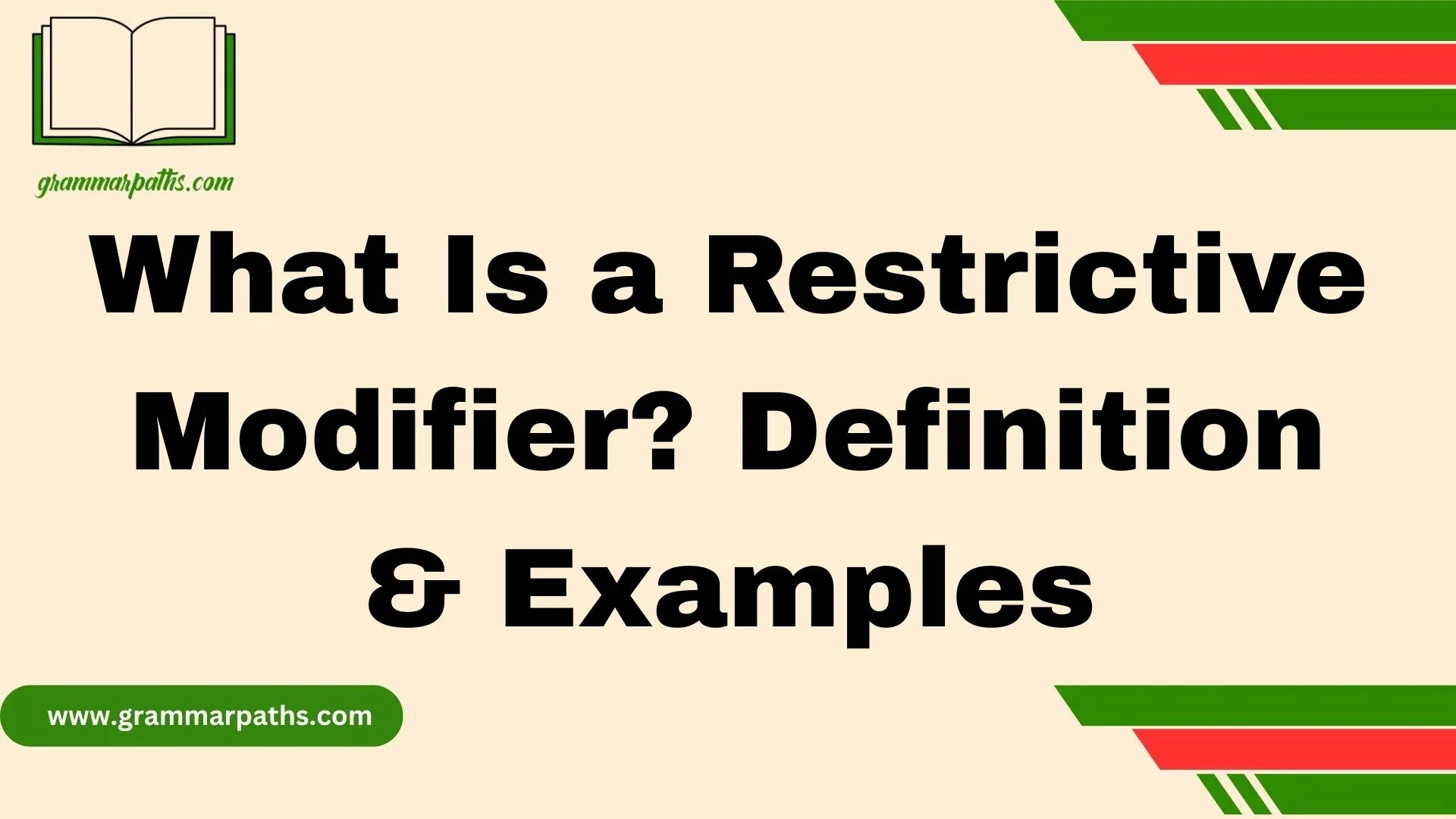I still remember the first time I tried to explain what is a restrictive modifier? definition & examples to a new learner. A restrictive modifier adds essential information to a noun—it defines, restricts, and modifies the sentence in a way that, without it, the entire meaning would change. In my editing experience, I often spot writers struggling with the usage of modifiers because they don’t realize how a clause or phrase must directly relate to the subject. For instance, “The student who studies hard passed the test” clearly shows how the modifier “who studies hard” is needed to identify which student. That small example makes a big difference, especially when the group, people, or teacher needs to understand the exact details.
When I coach students on writing, I emphasize clarity and precision. A restrictive modifier gives you the detail you need without overexplaining. It allows your ideas to remain precise, while still providing the necessary structure. It also removes any ambiguity by pointing to the exact noun it modifies. And yes, the wrong placement can seriously affect your sentence’s flow. These modifiers don’t just help a reader; they help the writer too. They keep the message focused and ensure that your writing says exactly what you mean, nothing more and nothing less.
What Is a Restrictive Modifier?
At its core, a restrictive modifier is a word or phrase that limits or defines the noun or pronoun it modifies. It tells you exactly which person, place, or thing we’re talking about. Without it, the meaning changes or becomes too broad.
Think of it like a spotlight in a crowd. It narrows your focus from many to one.
Simple Example:
- Restrictive modifier: Students who study hard pass the test.
- Only the students who study hard pass.
- Only the students who study hard pass.
- Without modifier: Students pass the test.
- That could mean all students pass, no matter what.
Here, who study hard restricts the group. It’s essential to know exactly which students.
Common Types of Restrictive Modifiers:
- Relative clauses: Usually start with who, that, or which
- Phrases: Prepositional or participial phrases
- Single words: Like only or just (when they limit meaning)
How Restrictive Modifiers Improve Clarity
Clear writing doesn’t happen by accident. Restrictive modifiers cut out the noise and keep your sentence focused.
Imagine telling a friend: “I like the movies with Tom Hanks.” If you leave out the modifier, “with Tom Hanks,” your friend might think you like all movies, not just those starring him. Restrictive modifiers prevent this kind of mix-up.
| Sentence with Restrictive Modifier | Sentence without Restrictive Modifier | Meaning Difference |
| I want the book that has a red cover. | I want the book. | Specifies which book among many. |
| People who exercise regularly stay healthy. | People stay healthy. | Restricts to only those who exercise. |
| The students wearing glasses took the test. | The students took the test. | Only students wearing glasses took the test. |
Visualizing Sentence Focus
Consider this diagram for The cars that are electric are quiet:
- Main noun: Cars
- Restrictive modifier: that are electric (only these cars)
- Result: Only electric cars are quiet; others may not be.
This spotlight keeps your message on target.
Restrictive vs. Nonrestrictive Modifiers: Know the Difference
Mistaking restrictive for nonrestrictive modifiers is a common error that leads to confusion.
- Restrictive modifier: Limits or defines, no commas
- Nonrestrictive modifier: Adds extra info, set off by commas
Examples Side-by-Side
| Sentence | Modifier Type | Meaning |
| The book that has a red cover is mine. | Restrictive | Only the red-covered book is mine. |
| The book, which has a red cover, is mine. | Nonrestrictive | I’m adding info about the book. |
You can test this easily: remove the modifier. If the sentence meaning changes drastically, the modifier is restrictive.
Remember
Restrictive modifiers do NOT get commas.
Real-Life Examples of Restrictive Modifiers
These modifiers aren’t just grammar class curiosities—they’re everywhere.
In Social Media:
- Friends who support you are true friends.
- Posts that get lots of likes usually go viral.
School Writing:
- The student who turned in the essay late lost points.
- Plants that grow in the desert need less water.
Work Emails:
- The report that includes last month’s sales is attached.
- Employees who complete training get certification.
Pop Culture:
Lyrics from songs or TV scripts often use restrictive modifiers to tell stories:
- “People who can’t handle me don’t deserve me.” (Song lyric)
- “Cars that go fast win the race.” (TV show dialogue
Common Errors with Modifiers (and How to Avoid Them)
Misplaced Modifiers
These happen when the modifier is too far from the word it describes.
- Wrong: She almost drove her kids to school every day.
- Right: She drove her kids to school almost every day.
The first implies she almost drove (meaning she didn’t actually drive). The second shows she drove regularly but not daily.
Dangling Modifiers
A modifier that doesn’t clearly attach to a word.
- Wrong: Running late, the bus was missed.
- Right: Running late, I missed the bus.
Here, running late needs a clear subject.
How to Fix:
- Place the modifier directly next to the word it modifies.
- Rewrite the sentence if the subject is unclear.
Restrictive Modifiers as Adjectives
Adjectives can also be restrictive when they specify which noun you mean.
Examples:
- The blue car is mine. (Restricts to the blue one, not any car)
- Students enrolled in the advanced class meet here.
- Only certified professionals can enter.
This limits meaning, telling you exactly who or what fits.
Restrictive Modifiers as Adverbs
Adverbs such as only, just, or even can act restrictively, shaping the whole sentence.
Placement is everything.
Examples:
| Sentence | Meaning |
| Only she said he stole the car. | No one else said it, just she did. |
| She only said he stole the car. | She said it, but did nothing else. |
| She said only he stole the car. | She said that nobody but he stole it. |
Moving only changes the sentence focus completely.
Punctuation Rules for Restrictive Modifiers
Here’s the golden rule: Don’t use commas to set off restrictive modifiers.
- Correct: The man who wore a hat left early.
- Incorrect: The man, who wore a hat, left early.
The second sentence suggests the man’s hat is extra info. The first restricts to the man wearing a hat, not any man.
Quick Tips:
| Rule | Example |
| Restrictive (essential) = no commas | The car that broke down was old. |
| Nonrestrictive (extra info) = commas | The car, which was old, broke down. |
Remember: Commas can change meaning dramatically!
Advanced Usage: Clauses, Phrases, and Words
Restrictive modifiers come in different flavors. Knowing each helps you spot and use them well.
Relative Clauses
Start with who, whom, that, which.
- The teacher who teaches math is strict.
- The book that I borrowed is due tomorrow.
Participial Phrases
Verb forms acting like adjectives.
- Students working late stayed after class.
- Cars parked illegally will be towed.
Prepositional Phrases
Start with a preposition.
- The house on the corner is for sale.
- The guy with the red hat is my friend.
Single Words
Modifiers like only restrict meaning.
- Only applicants with experience apply.
- Just the right amount of sugar is enough.
How to Spot and Test Restrictive Modifiers
Want a quick way to identify them? Use this checklist:
- Does the modifier limit or define the noun?
- Can you remove it without changing the sentence meaning?
- Are commas used? If yes, likely nonrestrictive.
- Is it close to the word it modifies?
“Cut it Out” Test
Try removing the modifier. If the sentence meaning collapses or changes a lot, it’s restrictive.
Quiz: Can You Identify the Restrictive Modifier?
Test your skills with these sentences. Which modifiers are restrictive?
- The dog that barks loudly keeps the neighbors awake.
- My brother, who lives in New York, is visiting next week.
- The cake with chocolate frosting was delicious.
- She wore a hat, which was very colorful.
- Students studying late get extra help.
Answers:
- Restrictive
- Nonrestrictive
- Restrictive
- Nonrestrictive
- Restrictive
Final Tips for Mastering Modifier Usage
- Place modifiers right next to the word they describe.
- Avoid commas around restrictive modifiers.
- Read your sentences aloud. If meaning is fuzzy, check modifiers.
- Use simple tests: remove, move, or add commas to see meaning shifts.
- Use grammar tools and peer reviews to catch mistakes.
Conclusion:
Understanding what is a restrictive modifier? definition & examples is crucial if you want to write with precision and purpose. A restrictive modifier ensures your sentence conveys the exact meaning you intend by pointing to essential information that defines or limits a noun. Without it, clarity suffers, and your writing can mislead or confuse. Whether you’re a teacher, student, or just someone refining their skills, mastering these modifiers will improve how you communicate, structure your thoughts, and remove ambiguity from your ideas. Remember: the right modifier doesn’t just add words—it adds value.
FAQs:
What is a restrictive modifier?
A restrictive modifier is a word, phrase, or clause that is essential to the meaning of the sentence. It identifies or limits the noun it modifies and is not separated by commas.
How is a restrictive modifier different from a nonrestrictive modifier?
A restrictive modifier provides necessary information and changes the meaning if removed, while a nonrestrictive modifier adds extra information and is usually set off with commas.
Can a single word be a restrictive modifier?
Yes. Even a single adjective or adverb can act as a restrictive modifier if it limits or defines the noun in a necessary way.
Do restrictive modifiers always follow the noun?
Not always. Restrictive modifiers can come before or after the noun they modify, depending on whether they are words, phrases, or clauses.
Should restrictive modifiers be set off with commas?
No. Restrictive modifiers should not be separated by commas because they contain essential information required for understanding the sentence.
Why are restrictive modifiers important in writing?
They help clarify which specific person or thing you’re talking about, reducing ambiguity and improving the overall precision of your writing.

Mia Rose is the passionate writer and founder of GrammarPaths.com, a resource dedicated to helping learners master English grammar, idioms, and writing skills with ease. With a deep love for language and years of experience in teaching and content creation, Mia simplifies complex grammar rules into clear, practical guides that readers can instantly apply.












